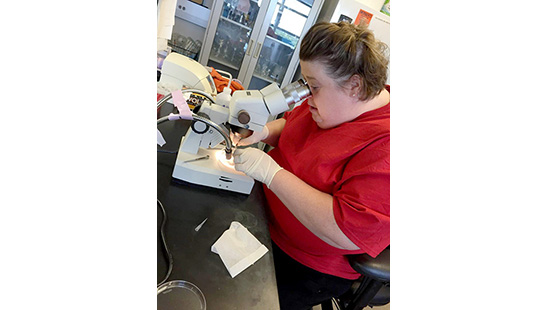UK offers experiential learning to STEM teachers
UK offers experiential learning to STEM teachers

Teaching science is one thing, experiencing it is another. Through a unique program, Kentucky science, technology, engineering and mathematics teachers spent this past summer experiencing the subjects first-hand on the University of Kentucky campus through the STEM PRIDE program.
Spearheaded by faculty and staff in the UK College of Agriculture, Food and Environment and College of Education, the two-year program focuses on providing teachers of middle and high school students and area technology centers broad experience in each area.
“The teachers get to see what happens in research labs at a university and in a related industry and how they connect or differ in practices, skills and the questions that the researchers ask,” said Carol Hanley, a staff member in the Office for Environmental Programs Outreach Services and project principal investigator. “To our knowledge, we are the only ones with a program like this.”
These are opportunities teachers wouldn’t have received going straight from college graduation into a K-12 classroom—opportunities that can provide them with background and context as they educate and guide students interested in pursuing careers in one of these fields. It is made possible by a Kentucky Council on Postsecondary Education grant.
“We all recognize the need for our educational system to better prepare students for the world,” said Brett Criswell, UK clinical assistant professor of STEM Education. “The idea we had was to start with the teachers and help them really understand the world of STEM research.”
During summer 2015, teachers from six school districts worked in the labs of researchers at UK and Bluegrass Community and Technical College. Schools were chosen based on a priority list from the Kentucky Council on Postsecondary Education that focused on districts that were lacking in certified STEM educators and had student needs.
While in the lab, the teachers worked on investigations beside researchers and graduate students. The teachers plan to develop their own teaching modules based on these experiences.
“I think it was a great surprise to the teachers, because their idea of what research was totally changed this summer,” said Eve Proffitt, UK director of the P20 Innovation Lab. “These teachers see the value of the research process and how they can connect that to their classroom.”
In the summer of 2016, the teachers will work with an industry mentor. Teachers will keep in contact with both their university and industry mentors throughout both years of the experience.
The program focuses on eight STEM areas including nutrition, manufacturing, energy, medicine, biology, agriculture, earth science and chemistry. Participating researchers are from the UK Center for Applied Energy Research and the colleges of pharmacy, engineering, medicine, arts and sciences and agriculture, food and environment. Industry representatives include Alltech, Big Ass Fans, Louisville Gas and Electric and Kentucky Utilities, Markey Cancer Center, Transposagen Biopharmaceuticals, Ferm Solutions, Amec Foster Wheeler and Evolva.
“Everybody we partnered with was willing to help, because they know the importance of having quality K-12 teachers, quality K-12 education and better students,” Hanley said.
During the school year, participating university faculty will visit the classes of each of the teachers they mentored to share information about their careers with students. The teachers are encouraged to take their classes on a field trip to the lab where they worked over the summer.
“This project really gets at the heart of STEM, helping teachers find their STEM identities and increasing STEM literacy. Most importantly, it connects them with like-minded colleagues, university faculty and industry professionals who are available on a regular basis to help them increase their overall content knowledge as well as integrate it into their classroom,” said Margaret Mohr-Schroeder, UK associate professor of STEM Education and co-chair of the Secondary Mathematics Program.
College of Education faculty were also able to share this experience with students in their Master’s with Initial Certification program. The goal is for STEM PRIDE to be sustained for both experienced and future teachers.
Environment Events Research

